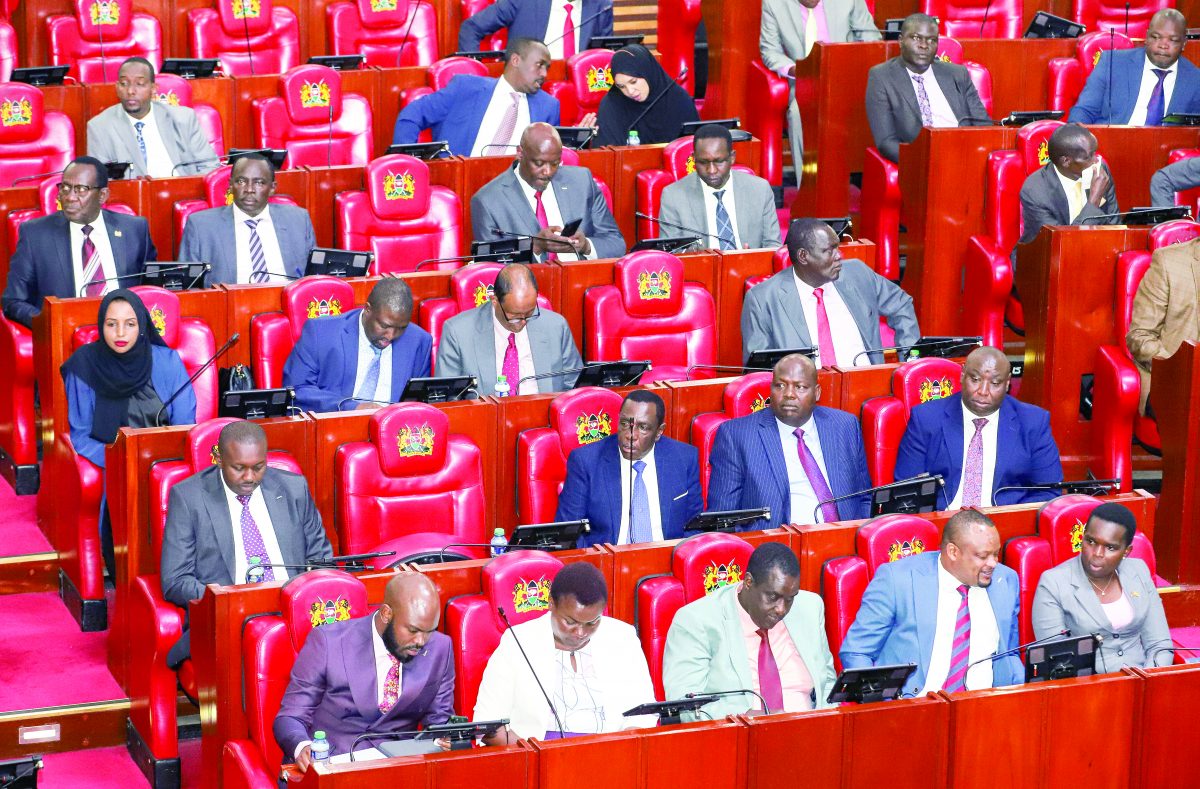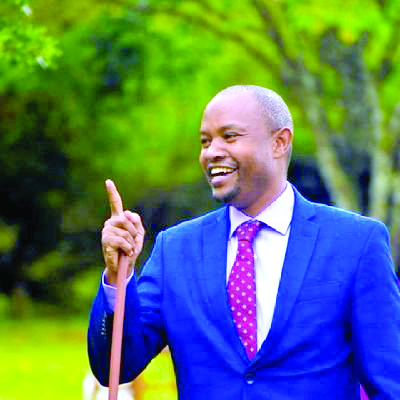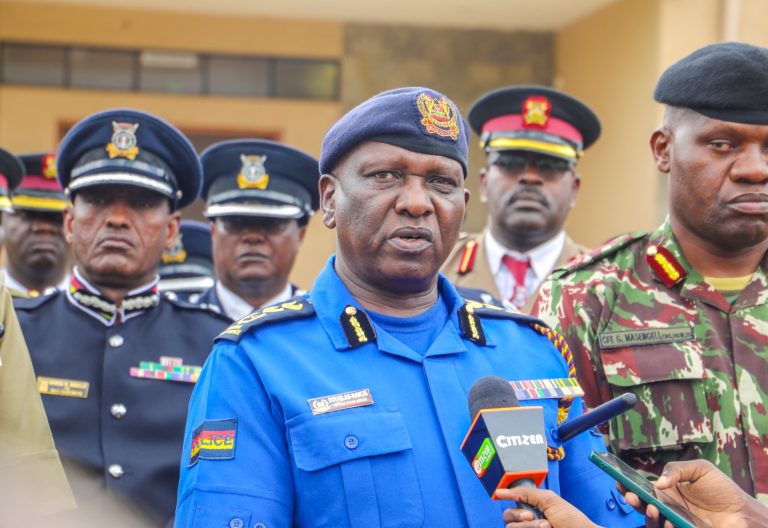Budget sets priority spending areas for Ruto’s administration

Treasury Cabinet Secretary Njuguna Ndung’u yesterday unveiled Kenya Kwanza’s maiden Sh3.68 trillion Budget outlining how President William Ruto’s government plans to spend taxpayers’ money over the next financial year, starting July 1.
The Budget comes against the backdrop of local and external economic shocks — including high cost of living, high debt burden and a weakening shilling that has taken a hit from a global dollar shortage.
According to Ndung’u’s tax and spend plan, Kenya Kwanza plans to collect at least Sh4 trillion in taxes over the next two years. This could signal more financial pain for taxpayers already saddled by the struggling economy although it also offers some reliefs to cushion the pain. For instance, landlords and landladies will pay 7.5 per cent as tax on their rental incomes, down from the earlier 10 per cent. Manufacturers of sugar and cement and makers of furniture have also been cushioned after Ndung’u slapped duty on imported sugar, cement and furniture. Only imports from the East African Community will be exempted from the import duty.
Over the Medium Term ending 2025, the Sh4 trillion tax collection by Kenya Revenue Authority (KRA) will ride on the Sh2.57 trillion ordinary taxes that the authority will be tasked to collect from July to fund the Sh3.68 trillion Budget, Kenya’s highest since independence.
“Mr Speaker, in fulfillment of the requirement under the Constitution on public participation, we accorded Kenyans the opportunity to share their views on issues that need to addressed in this Budget,” the CS said in an apparent attempt to shield the Budget statement from criticism over some of its proposals that will see Kenyan workers cough up more to the taxman.
His speech came shortly after MPs from the Minority staged a dramatic walkout in protest, saying their presence in the chamber would validate the Budget statement, which they described as “fraudulent” (see separate story).
Three hours
The 2023/24 Budget, which is the first administration’s full-year budget, has surpassed the Jubilee administration’s last Budget by about Sh380 billion.
“As part of the economic turnaround plan, the Government will scale up revenue collection efforts by the Kenya Revenue Authority (KRA) to Sh4.0 trillion over the medium term. In order to achieve this, the Government is undertaking a combination of both tax administrative measures and tax policy reforms,” Ndung’u said in his first Budget presentation, which lasted three hours and 20 minutes.
He said the government plans to raise at least Sh2.96 trillion from revenue collections, Sh348 billion from Appropriations in aid and Sh42 billion from grants.
“The Medium-Term Revenue Strategy comprises legal, administrative and policy measures to reform the tax system which is expected to boost tax revenues over the medium term,” said Ndung’u, who also warned that tax exemptions and subsidies will be eliminated after MPs approve the Budget.
Ruto’s administration, cornered in the tough act of resource availability and spending pressures, will borrow Sh718 billion to fund the remaining Budget gap. The deficit will be financed through borrowing Sh586.5 billion domestically and Sh131.5 billion from external financiers.
Out of the Sh3.68 trillion, recurrent expenditures will consume Sh2.53 trillion (equivalent to 15.6 per cent of the Gross Domestic Budget) while development expenditures, including allocations to projects, contingency fund, Equalization Fund and conditional capital transfers to County Governments will gobble up Sh743.5 billion.
Middle class
For the first time, Treasury has not disclosed in the Budget speech the precise allocation for the Executive arm of government but its Budget Policy Statements estimates the amount at Sh2.16 trillion. Meanwhile, Sh41 billion has been allocated to Parliament and Sh23.2 billion to the Judiciary.
Counties will receive Sh385.4 billion as part of the shareable revenue while expenditure items known as the Consolidated Fund Services (CFS) have been allocated Sh1.836 trillion.
KRA is expected conduct various reforms and be more proactive while raising revenue from the expanded tax base and increased rates that are expected to hit the middle class most.
In keeping with the government’s promise of uplifting the less privileged and aid economic recovery, CS Ndung’u said the Budget will prioritise five key sectors expected to have the highest positive impact on the economy. These are agriculture, Micro, Small and Medium-sized Enterprises, housing and settlement, healthcare, and the digital superhighway and creative economy.
“This year’s Budget places special emphasis on priorities under Bottom-Up Economic Agenda. This agenda is premised to address the challenge the economy is facing, stimulate economic recovery, boost resilience while building on the success realised over time,” said Ndung’u.
One of the biggest winners is the Education sector, which has received Sh628.6 billion, translating to 17 per cent of the Budget, mainly to finance the transition to the new Competency-Based Curriculum (CBC), hiring of new teachers by the Teachers Service Commission (TSC), and funding the cash-strapped higher education and affiliated agencies.
Value chains
Agriculture will get Sh49.9 billion for various programmes. From this allocation, Sh5 billion is proposed for the fertilizer subsidy programme and Sh8.6 billion for the National Agricultural Value Chain Development Project.
De-risking and supporting Pastoral Economies will consume Sh3.7 billion while Sh2.8 billion will go into emergency locust response. Sh1.3 billion is for food production and nutrition security programme.
The nine value chains targeted by various allocations across the Budget statement are cotton, coffee, leather, edible oils, dairy, rice, tea, the blue economy, and construction and building materials. Many of this will have a direct impact on the agriculture sector, Kenya’s largest employer.
The health sector has been allocated Sh141.2 billion (3.8 per cent of the Budget). This will go into delivering Universal Health Coverage (UHC), supporting Covid-19 emergency response projects, HIV/Aids and malaria campaigns, and construction and maintenance of cancer centres.
The leading referral hospitals, Kenyatta National Hospital (KNH) and Moi Teaching and Referral Hospital, will receive Sh12.8 billion and Sh8.8 billion respectively.
And to tap into the digital space, which mostly employs the youth, the Information, Communication and Technology sector will be allocated Sh15.1 billion, with the Konza project and the National Optic Fibre Backbone expansion taking the biggest chunk. The Last Mile County Connectivity Network will also get Sh583 million for maintenance and rehabilitation.









